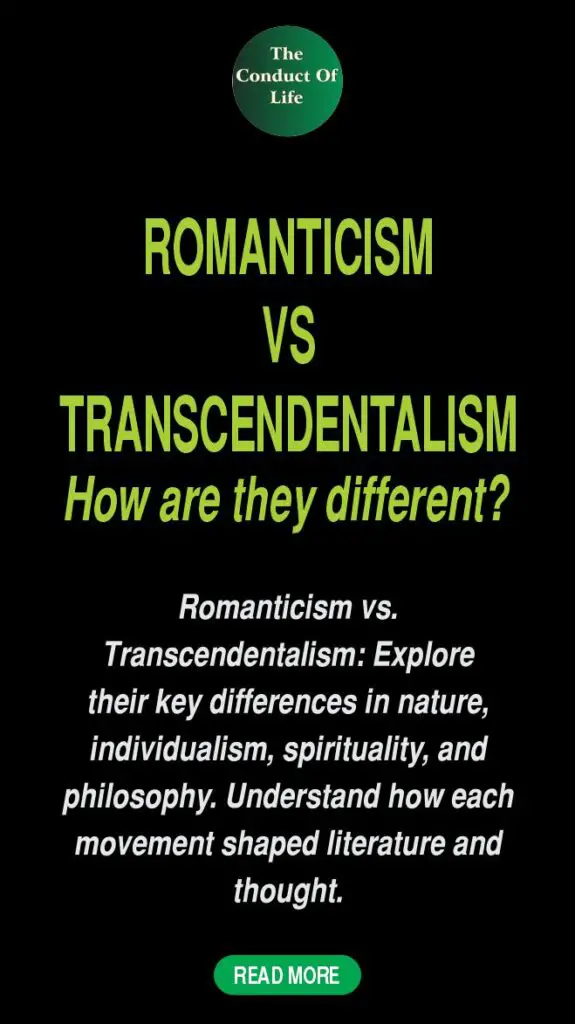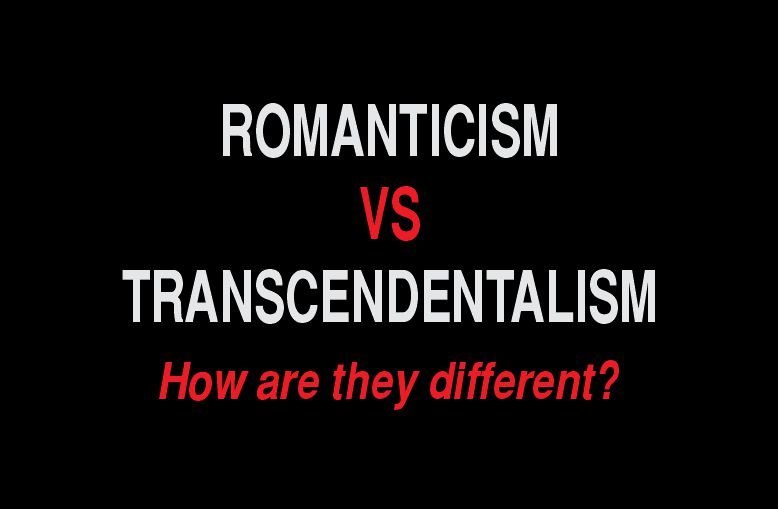Romanticism vs Transcendentalism: explore the key differences between these literary movements, from their views on nature and human nature to spirituality, individualism, and philosophy. Discover how each shaped art, literature, and thought.
Romanticism and Transcendentalism are two significant literary and philosophical movements that emerged in the 18th and 19th centuries.
While they share common themes such as a reverence for nature and individualism, they differ in fundamental ways.
Romanticism emphasizes deep emotions, imagination, and the mysteries of life, often exploring the dark and gothic aspects of human experience.
Transcendentalism, on the other hand, focuses on self-reliance, intuition, and the belief that individuals can transcend the physical world to attain higher knowledge.
This article explores their key distinctions, providing clarity on how these movements influenced literature, thought, and the perception of human existence.

Romanticism vs Transcendentalism: Defining Both
What is Romanticism?
Romanticism was a literary, artistic, and philosophical movement from the late 18th to early 19th century that opposed Enlightenment rationalism, emphasizing emotion, intuition, and individualism.
Romanticism celebrated nature’s beauty, imagination, and the supernatural, with key figures like Wordsworth, Shelley, and Poe exploring passion, mystery, and the untamed human spirit.
What is Transcendentalism?
Transcendentalism was a 19th-century American philosophical movement, rooted in self-reliance, intuition, and spiritual connection with nature.
Influenced by Romanticism, it rejected societal norms, emphasizing inner truth and personal enlightenment.
Thinkers like Emerson and Thoreau championed individual freedom, introspection, and higher understanding beyond sensory experience through nature and self-improvement.
Recommended: 10 Examples of Transcendentalism
Romanticism vs Transcendentalism: The Differences
1. Nature
Romanticism
Romanticism views nature as powerful, mysterious, and sometimes dark. It often highlights nature’s ability to evoke deep emotions, portraying it as both beautiful and untamed, capable of destruction and wonder.
Writers like Edgar Allan Poe and Mary Shelley explored its gothic and supernatural aspects.
Transcendentalism
Transcendentalism sees nature as divine and a direct reflection of higher spiritual truth.
Transcendentalists, such as Ralph Waldo Emerson and Henry David Thoreau, believed that immersing oneself in nature leads to enlightenment, inner peace, and a connection with the universe.
2. Human Nature
Romanticism
Romanticism emphasizes human emotions, imagination, and internal conflicts. Romantics believed that individuals are complex and often struggle with inner turmoil, passions, and desires.
The movement frequently explored themes of melancholy, longing, and personal suffering.
Transcendentalism
Transcendentalism holds that humans are inherently good and capable of self-growth.
Transcendentalists focused on self-improvement and self-reliance, believing that individuals should trust their intuition and strive for personal and moral development.
3. Spirituality
Romanticism
Romanticism often embraces the supernatural, gothic, and mystical elements. It portrays spirituality as mysterious and sometimes eerie, delving into the unknown and the subconscious mind.
Many Romantic works explore themes of fate, destiny, and the unknown.
Transcendentalism
Transcendentalism advocates for personal spirituality beyond organized religion. It emphasizes individual enlightenment, rejecting dogmatic beliefs in favor of personal experience and self-discovery.
Emerson’s idea of the “Over-Soul” represents this belief in a universal spiritual connection.
4. Individualism
Romanticism
Romanticism celebrates individual emotions and personal struggles. The movement emphasizes artistic expression and the depth of personal experiences, often focusing on the struggles of misunderstood individuals or tragic heroes.
Transcendentalism
Encourages self-reliance, intuition, and inner wisdom. Transcendentalists believed in forging one’s own path and rejecting societal conventions in favor of personal truth and independence.
Philosophy
Romanticism
Focuses on emotions, imagination, and artistic expression. Romantics value beauty, creativity, and the depth of feeling in literature, music, and visual arts.
Transcendentalism
More concerned with philosophy, self-discovery, and moral truth. It emphasizes intellectual growth, personal enlightenment, and the pursuit of higher knowledge through intuition rather than reason.
Conclusion
Although Romanticism and Transcendentalism share a love for nature and individualism, they approach these themes in distinct ways.
Romanticism thrives on emotion, mystery, and artistic expression, while Transcendentalism seeks spiritual enlightenment, self-reliance, and harmony with nature.
Both movements continue to influence literature, philosophy, and personal thought, shaping how we view the world and our place within it.
Pious Clements is the insightful voice behind "The Conducts of Life" blog, where he writes about life ethics, self-development, life mastery, and the dynamics of people and society.
With a profound understanding of human behaviuor and societal dynamics, Pious offers thought-provoking perspectives on ethical living and personal growth.
Through engaging narratives and astute observations, he inspires readers to navigate life's complexities with wisdom and integrity, encouraging a deeper understanding of the human experience and our place within society.
